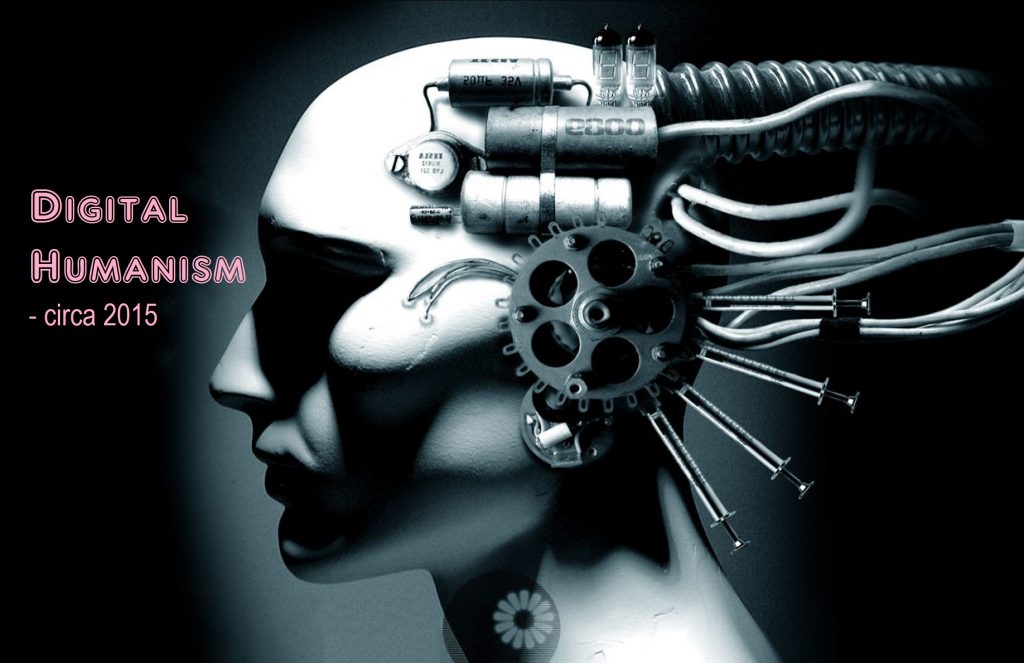The world at present is a transformed world–the digital revolution has taken the lives of people by storm and left many confused in its wake. Many have also been enlightened and have fully embraced this new world, finding previously unknown potential and opportunities. It is the digital age where everyone remains connected through the powers of the internet. Information is abundantly available for anyone who needs it, and many norms and standard processes have been inherently transformed, whether it be in the field of business, or day-to-day lives of individuals. One of the new, modern notions that has come to the fore much more in recent times and in the light of recent developments in technology is the notion of humanity in the digital age, or digital humanism.
Although not essentially a brand new concept, digital humanism is slowly becoming more and more relevant to the passage of time. This fact is supported by many thought leaders globally. Even Gartner has declared ‘digital humanism’ as the latest buzzword for 2015. Especially in this fast digital age, it is important to grasp and comprehend the concept of digital humanism and its consequences. The core concept of digital humanism lies in the notion that technological advancements happen for one reason only–to empower people.
The very definition of digital humanism stems from the concrete notion that people should always remain the focus during the manifestation and development of digital businesses. Those companies that implement the concept of digital humanism in their modus operandi basically try to leverage modern and ever-developing technology in such a way so as to allow people to achieve goals that were not feasibly achievable before, and to change the way people reach their goals.
The concept of digital humanism is a polar opposite to the concept of what is termed as “digital machinism”, which holds the opinion that the best way forward is through automation and minimizing the human involvement factor. People and companies that embrace digital humanism understand fully well that it is actually people and not machines that constitute the central, focal point of the day-to-day governance of most businesses. In a nutshell, digital humanism deals with concepts and ideas that simplify rather than complicate, while providing people with a lot more power to bring about positive change.
Digital Humanism–A Quick Primer
To understand digital humanism a little better, we need to draw our attention towards certain technological changes that the world is witnessing at a rapid pace at the present time. With more and more people adopting smart devices, the world has become more connected. The fact that more people spend a time on the internet and use it as a medium of expression, decision-making and transactions has given rise to a continuous, never-ending stream of large volumes of data, eventually giving rise to the concept of Big Data. Another new concept is the Internet of Things, which deals with the fact that objects can be made intelligent through the use of sensors and the internet.
These developments have not only transformed lives, they have proliferated into our normal, day to day living. According to certain projections, planet Earth will be home to about 8 billion smart devices and 30 billion things which have embedded intelligence. This means that for every human being on the planet, there will be six intelligent devices or objects–a lopsided ratio that provokes deep thought and debate. The major problem in such a scenario rests squarely on the shoulder of thought leaders in the field of information technology, who have the responsibility of properly and astutely orchestrating these new devices. New technology, new data streams and new user experiences need to be properly tailored and used to create value for people. The question here is what principles need to be applied to this process to ensure the desired results.
It is here that the concept of digital humanism shows its true value. The concept has one central theme–technology is only good or essential when it is for the people and not the other way around. The aim is to keep humanity in the forefront when it comes to creating and controlling business systems. This way, people will have better control and mastery of the technology they wield, and businesses get direct, organic benefits that simply cannot come from machine-driven philosophies or automation.
Digital Humanism–The Positives
The reason why digital humanism has come to the forefront at the present time is because it is a concept that brings a lot of positives–positives that can make a lasting difference to businesses and the world at large. Let us now take a look at some of these positives –
-
Empowering People
To build and evolve a business, there should always be clearly assigned roles for human workers and technology. There should be a harmony between the two and not an overlap. Organizations that use technology blindly as a tool for progress without caring about the people using those technologies inside the company are much less likely to succeed. Companies that embrace digital humanism appreciate the fact that by empowering human workers who can make an impact, there is an incredible opportunity to build new, efficient business systems and fine-tune existing ones.
For many long years, the business process management approach has been successful in turning human workers virtually into robots. Digital humanism inspires companies to leave behind such a dated and counter-intuitive approach, and allow people to work in a way that suits them best. Attempts to have entire business processes down on paper, leaving nothing to chance, anticipating every possibility and trying to establish a mechanical, standard procedure for everything, is discouraged. Instead, it is a lot better to let the people in the company figure things out for themselves. Leaving open spaces in your process design and designating responsibility to your human workers to fill up those spaces with their own knowledge, skills and experience is the best way forward.
-
Breeding Innovation
One of the most important positives about digital humanism is the fact that it can breed a high degree of innovation and out of box thinking. While advancements in digital technology have had many beneficial effects on life, it has also ushered an advanced layer of complexity. A great opportunity to breed innovation is to humanize digital systems and to let those systems target the inherent complexity of this world.
The concept of digital humanism is a perfect foil for the changing workplace, as businesses can easily enhance the effectiveness of their workforce. This can be done by updating their model of work and accommodating individual or group digital lifestyles according to their needs. Instead of using technology to optimize business processes, digital humanism dictates that people, their imagination and their creativity should be used to optimize and improve business processes.
-
Evolving towards Case Management
In the present world, a lot of what businesses have to do on a daily basis does not follow a set, standardized pattern. Much of what goes on is unpredictable and calls for highly dynamic, versatile and evolving systems to ensure that the most optimum outcomes can be accomplished at minimal overheads.
When every business scenario is seen as a separate case, the notion of stability and standardization becomes counter-intuitive, as every case is different and needs to be dealt with on the basis of its merits. It is obvious that when work becomes less structured, the pressure on workers increases manifold. Technology can be a godsend in these circumstances, enabling people to be more productive and efficient. But the fact remains in plain view that since day-to-day business processes and transactions are fast becoming individual and separate case-based endeavors, companies need to start losing certain particular constraints that are routinely placed on a multitude of business processes. This will assist in providing the people who are actually accomplishing the work with a lot more, and much-needed, freedom.
Enterprise software applications and platforms also need to focus more on the people using them. The circumstances dictate that the right way forward for organizations in future is to develop and then implement enterprise level case management solution that use a data driven approach. This way companies can prioritize their people over their processes, adapt to new conditions and change their philosophy. Companies that find themselves able to accomplish this in the coming few years have much more of a chance to gain competitive advantage than those that do not.
As far as these positives are concerned, there is not a shadow of a doubt that, in the near future, more and more companies are likely to feel compelled to acknowledge and implement the notion of digital humanism in the way they run their businesses. Many companies are already in the process of changing and fine-tuning their business processes and including more and more of the human element so as to achieve better results. Keeping all these points in mind, it can only be said that digital humanism is a concept that is here to stay, and has the potential to change business philosophies, policies and processes as we know them in the course of the coming decade.





















